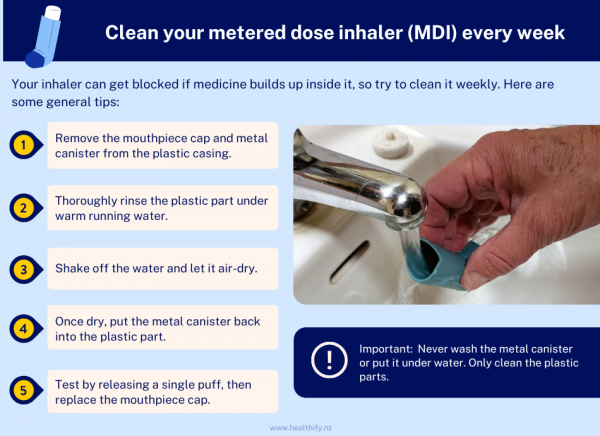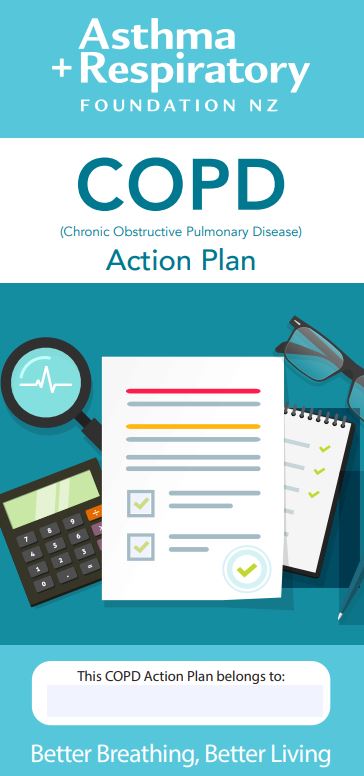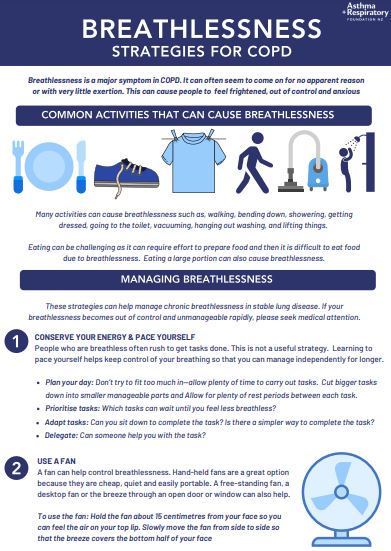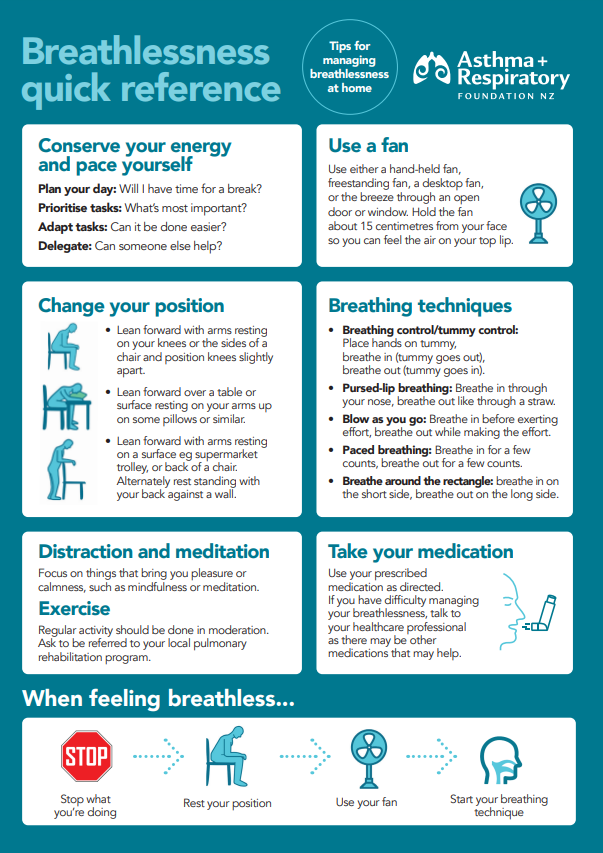If you're a frequent visitor to Healthify, why not share our site with a friend? Don't forget you can also browse Healthify without using your phone data.
Vannair for COPD
Also called budesonide and formoterol
Key points about Vannair for COPD
- Vannair is a combination of 2 medicines, budesonide and formoterol, in a single inhaler.
- In COPD it is used as long-term treatment to reduce the risk of exacerbations (flare-ups).
- Learn more about Vannair for COPD.

Vannair is a combination of 2 medicines, budesonide and formoterol, in a single inhaler.
- Budesonide is a corticosteroid. When inhaled it prevents swelling and irritation in the walls of the small air passages in your lungs. It's also called a preventer – when it's used every day it prevents shortness of breath and wheezing.
- Formoterol is a long-acting bronchodilator. It keeps your air passages open, making breathing easier.
When is Vannair used for COPD?
- Vannair is used for people with moderate to severe COPD if their symptoms are not well controlled with a long-acting muscarinic antagonist (LAMA) alone or a long-acting beta-agonist (LABA) such as formoterol. Adding an inhaled corticosteroid such as budesonide may be recommended as long-term treatment, to reduce the risk of flare-ups.
- Vannair is a long-term medicine for COPD that includes both formoterol and budesonide which are very effective when used together. It can also be used for people with asthma. Read more about Vannair for asthma.
- Remember to keep using Vannair even if you feel well. Read more about medicines for COPD.
Note: Vannair doesn’t give immediate relief from sudden breathing problems such as wheezing, tight chest or shortness of breath. To treat these symptoms, use your ‘reliever’ inhaler such as salbutamol (SalAir or Ventolin) or terbutaline.
Always use Vannair exactly as your healthcare provider has told you. The pharmacy label on your medicine will tell you how much to take, how often to take it and any special instructions.
In Aotearoa New Zealand, Vannair is a metered dose inhaler (MDI) that comes in two different strengths – Vannair 200/6 is used for COPD.
The usual dose is 2 puffs inhaled twice daily; maximum 4 puffs daily.
Always use Vannair with a spacer
- A spacer is an attachment to use with your inhaler. It's a chamber that holds the medicine before you inhale, giving you a more controlled, deeper inhalation. This can be especially helpful if you are short of breath.
- Using your MDI with a spacer makes it easier to use the inhaler and helps to get most of the medicine into your lungs where it’s needed (with less medicine ending up in your mouth and throat).
Use your MDI with a spacer
- A spacer is an attachment to use with your inhaler. It's a chamber that holds the medicine before you inhale, giving you a more controlled, deeper inhalation. This can be especially helpful if you are short of breath.
- Using your MDI with a spacer makes it easier to use the inhaler and helps to get most of the medicine into your lungs where it’s needed (with less medicine ending up in your mouth and throat).
Check your technique
- To get the most benefit from your inhaler it's important to use the correct technique.
- Ask your healthcare provider to show you how to use your MDI and spacer devices.
- Even if you’ve been shown before, if you still have any questions, ask your healthcare provider to explain how to use your inhaler.
The video below provides some guidance on how to use a spacer with your MDI. Note: Your MDI or spacer may look different to the one in the video below.
Video: How to use your spacer device
(Healthify He Puna Waiora, NZ and Auckland District Health Board, 2018)
Here are some things to know when you're using Vannair. Other things may be important as well, so ask your healthcare provider what you should know about.
- Rinse your mouth after each use: Vannair can cause a sore throat and hoarse voice. Rinse your mouth after each use to prevent this
- Vannair is available in different strengths: Ask your healthcare provider or pharmacist which strength you're taking. If your inhaler looks different to what you were expecting, ask your pharmacist about this.
- Keep track of your symptoms: Your healthcare provider will ask you about the number of exacerbations (flare ups) you have. Make a note of these so you can discuss your treatment with them, and whether you need to try a different inhaler.
Clean your MDI once a week
Clean your inhaler every week to ensure it doesn't get blocked. It's best to follow the cleaning instructions that come with your inhaler, but here is some general guidance:
- To clean the inhaler, remove the mouthpiece cap and metal canister from the plastic case.
- Rinse the plastic part under warm running water for at least 30 seconds.
- Shake off the water and let it air-dry.
- Once dry, put the metal canister back into the plastic case.
- Test your inhaler by pressing down to release one puff into the air, then replace the cap.

Like all medicines, Vannair can cause side effects, although not everyone gets them. If you're concerned about any symptoms you think might be related to your medicine, talk to your healthcare provider. The following information offers some guidance but doesn't include all possible side effects.
Common side effects
Tell your healthcare provider if they bother you:
- Change in voice (hoarse voice), different taste in your mouth: Rinse your mouth after each use.
- Dry mouth or throat, cough.
- Feeling shaky, nervousness, have a tremor.
- Headache.
- Muscle cramps.
- Problems sleeping.
Tell your healthcare provider
- Signs of oral thrush (a fungal infection in your mouth) such as a very sore tongue, throat or mouth, with white sores on your tongue or in your mouth.
Tell your healthcare provider immediately or phone Healthline free on 0800 611 116 if these occur
- Changes in your heartbeat (faster), chest pain.
- Sudden changes in mood.
- Blurred vision or changes to your eyesight.
Read more about medicines and side effects and reporting a reaction you think might be a side effect.
Budesonide and formoterol(external link) NZ Formulary Patient Information
Vannair(external link) Medsafe Consumer Information Sheets, NZ
Brochures
COPD action plan(external link) Asthma and Respiratory Foundation, NZ English(external link), te reo Māori(external link), Samoan(external link), Tongan(external link), simplified Chinese(external link)
Breathlessness strategies for COPD(external link) Asthma + Respiratory Foundation, NZ, 2021
COPD breathlessness quick reference guide(external link) Asthma + Respiratory Foundation, NZ, 2021
References
- Global initiative for chronic obstructive lung disease GOLD, 2025
- Budesonide + formoterol(external link) NZ Formulary
Brochure

Asthma and Respiratory Foundation, NZ
English, te reo Māori, Samoan, Tongan, simplified Chinese

Asthma + Respiratory Foundation, NZ, 2021

Asthma + Respiratory Foundation, NZ, 2021
Credits: Sandra Ponen, Pharmacist, Healthify He Puna Waiora. Healthify is brought to you by Health Navigator Charitable Trust.
Reviewed by: Angela Lambie, Pharmacist, Auckland
Last reviewed:





